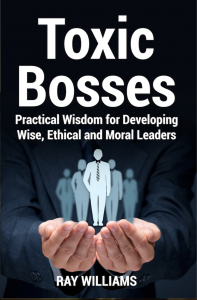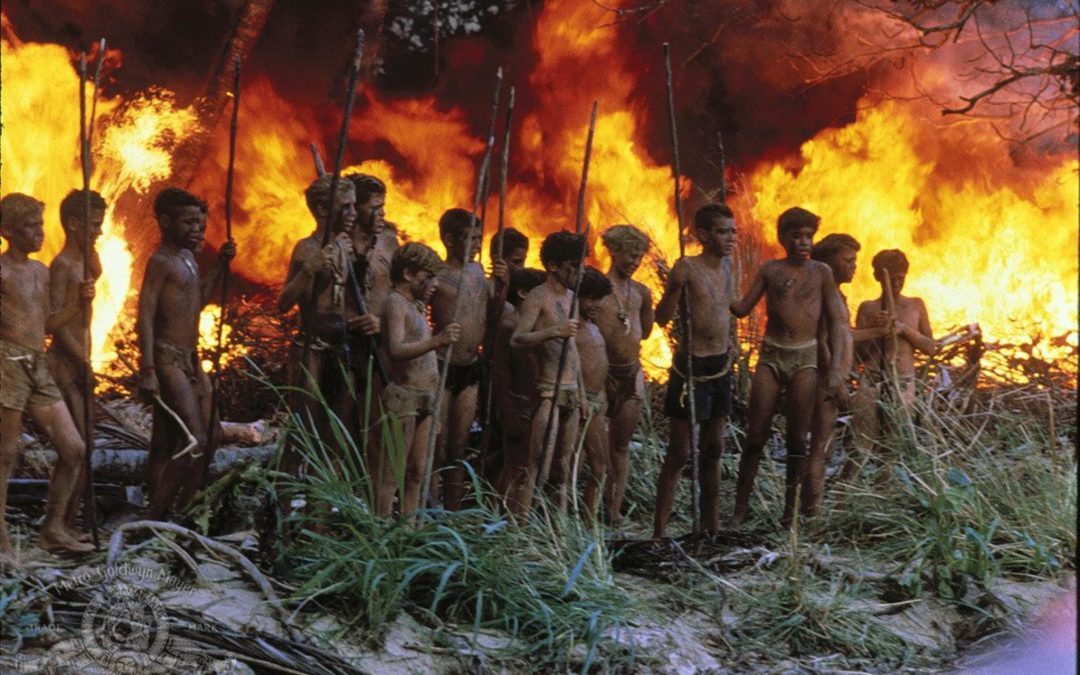By Ray Williams
May 24, 2021

For centuries western culture has been permeated by the idea that humans are selfish creatures. That cynical image of humanity has been proclaimed in films and novels, history books and scientific research, epitomized by the book Lord of the Flies by William Golding. But in the last 20 years, scientists from all over the world have presented research that shows a more hopeful view of mankind.
Lord of the Flies is a 1954 novel by Nobel Prize-winning British author William Golding.The book focuses on a group of British boys stranded on an uninhabited island and their disastrous attempt to govern themselves. The name “Lord of the Flies” is a literal translation of Beelzebub, from the Bible.
But you might not know the true story about the book, its troubled author, and the actual tale it’s based upon. More than that, how influential the book has been in modern beliefs of how humanity is basically bad not good.
Lord of the Flies message on the already controversial subjects of human nature and individual welfare versus the common good earned it position 68 on the American Library Association’s list of the 100 most frequently challenged books of 1990–1999. The book has been criticized as “cynical” and portraying humanity exclusively as “selfish creatures”. It has been linked with Tragedy of the Commons by Garrett Hardin and books by Ayn Rand.
Thus, only fourteen years after its release, Lord of the Flies became one of the most popular books on the market. The novel had become a “modern classic”. However, in 1970, Lord of the Flieswas on the decline. Whereas, in 1962, Golding was considered “Lord of the Campus” by Time magazine, eight years later no one seemed to be paying it much notice. Why is this? How did such an explosive book suddenly drop off after less than two decades?
An English schoolmaster, William Golding’s novel Lord of the Flies has sold tens of millions of copies, translated into more than 30 languages and hailed as one of the classics of the 20th century. In hindsight, the secret to the book’s success is clear. Golding had a masterful ability to portray the darkest depths of mankind.
Parallels have been drawn between the Lord of the Flies and an actual incident from 1965 when a group of schoolboys who sailed a stolen fishing boat from Tonga were hit by a storm and marooned on the uninhabited island of ʻAta, and were considered dead by their relatives in Nuku‘alofa. In Lord of the Flies, Golding describes the boys as degenerating into anarchy, chaos and primitive behavior.The 1954 novel depicts the gradual descent into barbaric darkness. Its portrayal of innate human depravity was hailed at the time for its unblinking “realism.”
Golding’s view of human nature was undoubtedly influenced by his own life. He’d had an unhappy childhood and later he became an alcoholic, prone to depression. And had a favorable view of authoritarianism. “I have always understood the Nazis,” Golding confessed, “because I am of that sort by nature.” And it was “partly out of that sad self-knowledge” that he wrote Lord of the Flies.
While the boys of ‘Ata have been consigned to obscurity, Golding’s book is still widely read. Media historians even credit him as being the unwitting originator of one of the most popular entertainment genres on television today: reality TV. “I read and reread Lord of the Flies,” divulged Mark Burnett, the creator of hit series Survivor in an interview.
The Real Story of the Shipwrecked Boys
Dutch historian Rutger Bregman, writing about the Lord of the Flies in his book superb 2019 book Humankind said that Golding’s portrayal was unrealistic at best. Bregman documents that Golding had no knowledge of behavioral science and was hardly an impartial judge of children’s propensities.
After learning about the man behind the tale, Bregman became curious about what would really happen if kids were left alone on an island. He kept poking into everything from scientific studies to news reports, and — amazingly — finally unearthed an actual incident of shipwrecked children.
He learned that, far from devolving into barbarism, the inventive teenagers had set up a functioning democracy and communal economy.
The boys depicted in Lord of the Flies — all between the ages of 13 and 16 — had been students at a Catholic boarding school in Nuku’alofa, the capital of Tonga. They made plans to sail to Fiji, 500 miles away, and provisioned themselves with two sacks of bananas, coconuts and a small gas burner before stealing the boat of a local fisherman they disliked. That night they encountered high seas and whipping winds, which tore apart their sail and snapped their rudder. After drifting for eight days and collecting rainwater in coconut shells, they landed on the small remove island of ‘Ata.
In his memoir, Ocean of Light, Peter Warner, the man who found and rescued the boys, described what they had accomplished on the island while stranded for 15 months. “The boys had set up a small commune with food garden, hollowed-out tree trunks to store rainwater, a gymnasium with curious weights, a badminton court, chicken pens and a permanent fire, all from handiwork, an old knife blade and much determination,” he wrote.
They also tended a signal fire for more than a year, in direct contrast with the boys of Lord of the Flies, whose infighting led to their signal fire dying out. But it was more than just a fire that separated the Tongan schoolboys from Ralph, Piggy and Jack in the novel. The real castaways maintained a roster of garden, kitchen and guard duties; imposed time-outs during arguments; and ended each day with music, with one of the boys, Kolo, playing a guitar made from driftwood and steel wire.
They experienced many hardships — scarce water and even a broken leg — and had their failures, as when their raft broke apart. But they survived for 15 months and were rescued on September 11, 1966. When rescued, the boys were extraordinarily healthy — physically, socially and spiritually.
The Prevailing Belief that Humans Are “Bad” Challenged by Research on Children
If there’s one belief that has been predominant for centuries is the tacit assumption that humans are bad. It’s a notion that drives newspaper headlines, TV shows and movies and guides the laws that shapes our lives. From the writings of Machiavelli to philosopher Thomas Hobbes and psychiatrist Sigmund Freud, and some would say even the Bible and Christianity, the roots of this belief have sunk deep into Western thought. Human beings, we have been taught, are by nature selfish and governed primarily by self-interest.
Yet researchers in recent years have challenged this belief, and have shown that humans are hardwired for kindness, compassion and generosity, and geared toward cooperation rather than competition and included to trust rather than distrust one another. In fact, these instincts have a firm evolutionary basis going back to the beginnings of Homo sapiens.
For example, A team of developmental psychologists led by Julia Ulber has published evidence in the Journal of Experimental Child Psychology that paints a more heart-warming picture. These psychologists point out that most past research has focused on how much toddlers share things that are already theirs. The new study looks instead at how much they share new things that previously no one owned. In such scenarios, toddlers frequently show admirable generosity and fairness.
In another study published in Psychological Science, 112 three-year-old children, an equal number of boys and girls, were split into teams of two and observed sharing rewards and resources.In roughly 80 percent of these cases of cooperation, the sharing was “passive,” meaning that one child took what was fair — two prizes — and left the other two for his or her teammate. Other times, one child would take two prizes and actively give two to the other child, or would tell that child to collect his or her fair share if he or she neglected to do so at first.
Rarely was there any arguing, and physical conflicts were almost nonexistent.

When psychologist Michael Tomasello, co-director of the Max Planck Institute for Evolutionary Anthropology in Leipzig watched young children in the experiments he’s designed, he sees acts of altruism and cooperation — along with more examples of what sets humans apart from other species.
“From when they first begin to walk and talk and become truly cultural beings, young human children are naturally cooperative and helpful in many — though obviously not all — situations,” Tomasello said during one of two lectures about the origins of human cooperation. “And they do not get this from adults; it comes naturally.”
Armed with data and several video clips of his experiments, Tomasello repeatedly showed during his two lectures that young children can be as selfless as they are adorable.
Lest you think he’s asserting there is no such thing as the “terrible twos,” Tomasello made clear the cooperative behavior he studies is “relative to nonhuman primates.” In other words, kids are quite altruistic when comparedto apes. They gesture to communicate that something is out of place. They empathize with those they sense have been wronged.
They have an almost reflexive desire to help, inform and share. And they do so without expectation or desire for reward, Tomasello said.
“There is very little evidence in any of these cases that children’s altruism is created by parents or any other form of socialization,” Tomasello said of his experiments.
Humans are not born selfish, as conventional wisdom might suggest, nor do they have to be reprogrammed to cooperate with others. At a young age, children show altruistic helping behaviors, a finding studied by University of Michigan researcher Felix Warneken, whose work is featured in the Netflix docuseries “Babies.”
“Young children already have the capacity to put another person’s interest in front of their own,” says Warneken, associate professor of psychology.
Ingenious experiments carried out at Yale University used these measures to look at babies’ minds. Their results suggest that even the youngest humans have a sense of right and wrong, and, furthermore, an instinct to prefer good over evil.
Research by the University of Washington’s Institute for Learning & Brain Sciences, or I-LABS, finds that altruism may begin in infancy. In a study of nearly 100 19-month-olds, researchers found that children, even when hungry, gave a tasty snack to a stranger in need. The findings not only show that infants engage in altruistic behavior, but also suggest that early social experiences can shape altruism.
Time to Reject Lord of the Flies View of Humanity
Political debate for centuries has turned on a critical argument about human nature. In one corner stands English philosopher Thomas Hobbes, says that, without a society to restrain our most basic instincts and left to our own devices, people will turn on each other. Society, theorized Hobbes, would thus collapse into an abysmal anarchy — a “war of all against all”, where life is solitary, poor, nasty, brutish and short. Hobbes stated “In the state of nature, force and fraud are the cardinal virtues. Every man has a right to what he can get and for as long as he can keep it.”
In contrast French philosopher Jean-Jacques Rousseau, countering “that man is naturally good, and that it is from these institutions alone that men become wicked”.
Bregman shows us that believing in human generosity and collaboration isn’t merely optimistic — it’s realistic. Moreover, it has huge implications for how society functions. When we think the worst of people it brings out the worst in our politics and economics. But if we believe in the reality of humanity’s kindness and altruism, it will form the foundation for achieving true change in society.
“While the boys of ‘Ata have been consigned to obscurity, Golding’s book is still widely read,” Bregman writes. “It’s time we told a different kind of story. The real Lord of the Flies is a tale of friendship and loyalty; one that illustrates how much stronger we are if we can lean on each other.”
In a separate interview with The Guardian, Bregman sees Humankind: A Hopeful History and its argument for humanity’s cooperative potential as providing support for specific policy proposals, notably a universal basic income, which he argued for in his previous book, Utopia for Realists.
Final Thoughts
There’s the world we live in, and then there’s the frightening world we see every hour on “the news” and in social media: Invading hordes of murderous immigrants; black and brown rioters and looters rampaging through city streets; police brutality; fictional organized squads of illegal voters and ballot thieves stealing elections; lazy bums mooching on food stamps and encroaching on “our beautiful suburbs; selfish and corrupt business leaders and politicians; fear and loathing and greed.
We shouldn’t be oblivious to or uncaring about the immorality, unethical behavior, avarice and violence that obviously abound in society; it’s there — inside corporations, police and military complexes, lobbyist-controlled governments, many religions, and other top-down constructs that prioritize profit and institutional command over democratic values and the common good.
But in striving to institute a culture of justice, it’s self-defeating to assume humankind is innately selfish, like Golding did in Lord of the Flies. Rather, we should shame the culprits as deviants and rally the majority to common-good solutions by appealing directly to their natural instincts for an egalitarian society that equitably shares both responsibilities and benefits like the young men from Tonga.
Read my new book, available on Amazon:Toxic Bosses: Practical Wisdom for Developing Wise, Moral and Ethical Leaders, where I examine in detail the impact that toxic bosses have on employee well-being.


